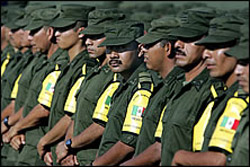 |
 |
 |
 News Around the Republic of Mexico | September 2005 News Around the Republic of Mexico | September 2005  
Army to Leave U.S. After Historic Mission
 Wire services Wire services


| | Members of the Mexican Army stand at attention on Monday during a Deployment Ceremony held at Kelly USA in San Antonio. (Photo: AP) |
After nearly three weeks of providing food and medical care to thousands of hurricane victims, a relief team from the Mexican army prepared to return home Monday.

Among their accomplishments were preparing and serving nearly 160,000 hot meals and performing 660 dental and medical exams.

Unarmed since leaving Mexico City on Sept. 7, the nearly 200 soldiers shook hands Monday with local dignitaries during a ceremony of appreciation before their expected departure early Tuesday for Mexico City.

The mood was far more amicable than the last time Mexican forces were here: in 1842, when they invaded San Antonio twice, or when they conquered the Alamo six years earlier.

San Antonio Mayor Hardberger was among a handful of U.S. civilian and military officials to thank Mexico for its relief work, which he said strengthened the bond between Mexico and this city of 1.2 million people, nearly 60 percent of whom are Hispanic.

"Your efforts here have been a model for how our two countries and our people should work together."

The Mexico relief team helped the U.S. effort in San Antonio take care of an evacuee population that reached as high as 15,000 in the wake of Hurricane Rita. The number of evacuees from Rita and Katrina stood around 4,700 Monday.

Gen. Francisco Ortiz Valadez, the Mexican commanding general, thanked local authorities and said he felt satisfied that the mission was completed without any major roadblocks.

The convoy, which includes 45 military vehicles. encountered only a few minor problems early in the operation. A couple of vehicles broke down on the way, and it took a day to hook up a water line to its encampment.

Those snags did little to hamper the overall relief effort made possible by a self-contained encampment within blocks of two major Red Cross shelters. They made up to 21,000 meals a day in one of two mobile kitchens, working some days up to 18 hours depending on the number of evacuees. | 
 | |
 |



